Analysis of Unilever's Business Context, Leadership, and Strategies
VerifiedAdded on 2021/01/01
|9
|2549
|265
Report
AI Summary
This report provides a comprehensive analysis of Unilever's business context, examining its history, vision, leadership styles, management practices, and organizational culture. The report explores how management style and culture influence business functions and strategies, highlighting the impact of autocratic leadership and the importance of employee engagement. It also discusses the company's vision, mission, and core values. The analysis covers various leadership styles, including autocratic and democratic approaches, and details how management practices like rewards, regular meetings, and employee engagement contribute to the company's success. Furthermore, the report assesses the influence of corporate culture on business performance, functions, and strategies. Based on the findings, the report offers recommendations for improvement, such as fostering collaboration and promoting non-discriminatory practices. The conclusion emphasizes the significant role of leadership styles and management practices in organizational success.
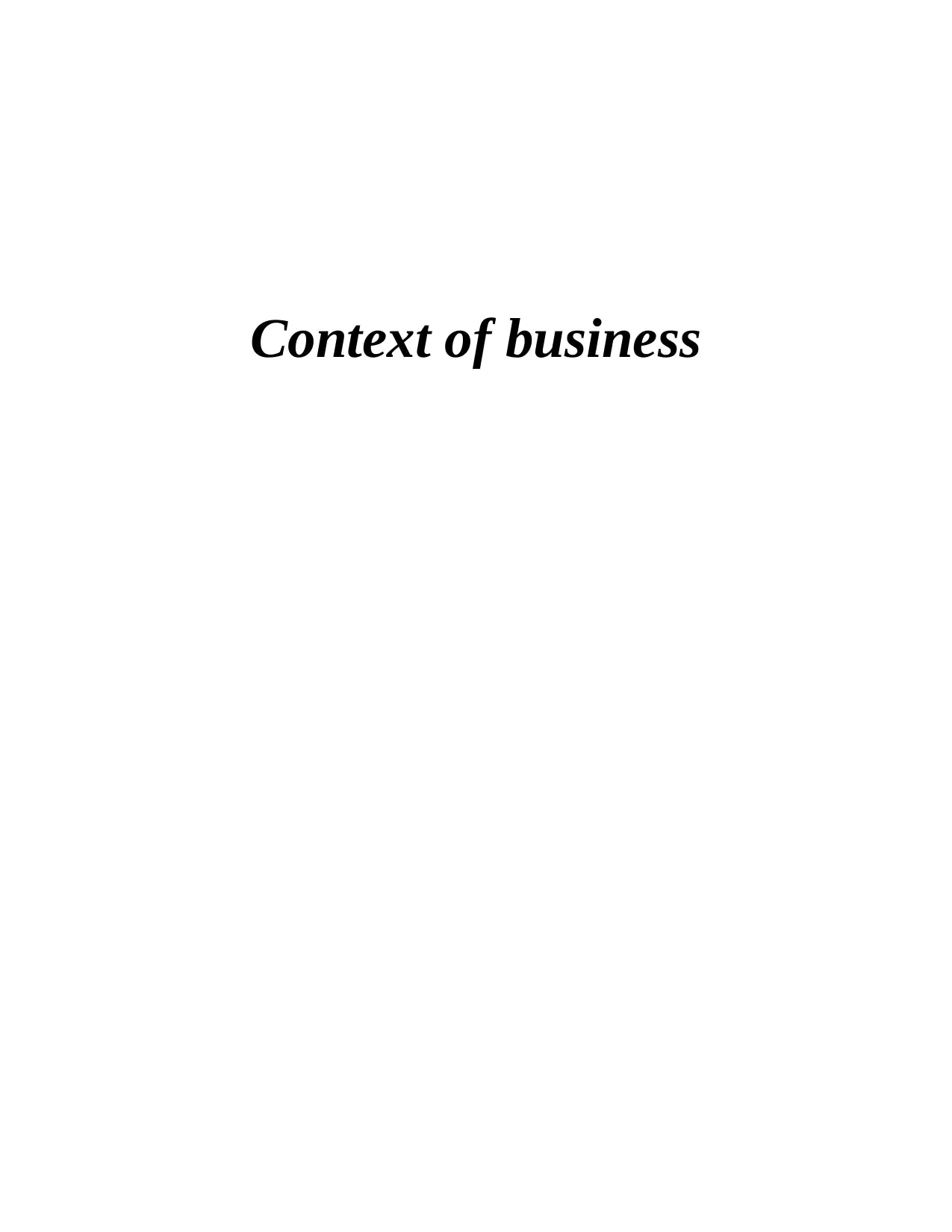
Context of business
Paraphrase This Document
Need a fresh take? Get an instant paraphrase of this document with our AI Paraphraser
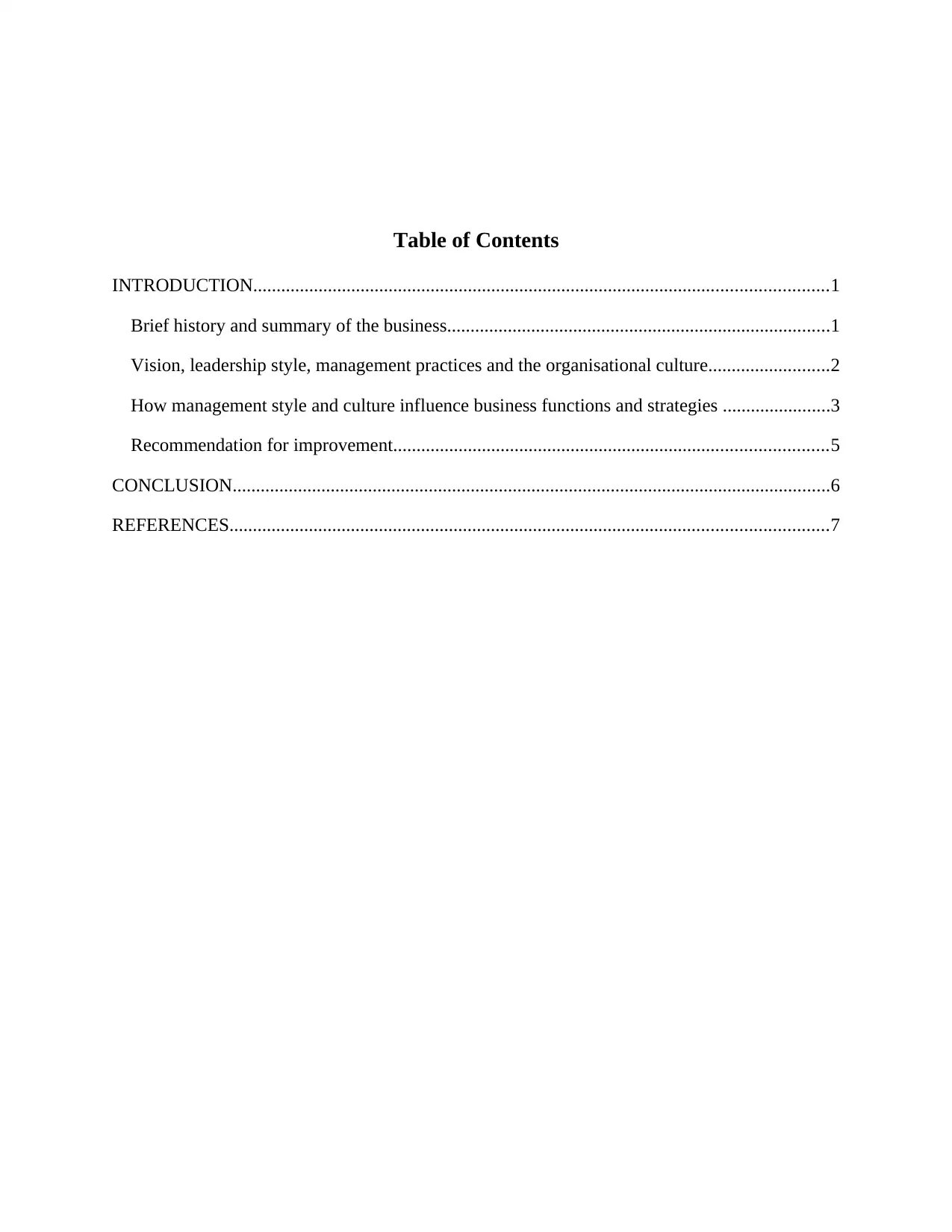
Table of Contents
INTRODUCTION...........................................................................................................................1
Brief history and summary of the business..................................................................................1
Vision, leadership style, management practices and the organisational culture..........................2
How management style and culture influence business functions and strategies .......................3
Recommendation for improvement.............................................................................................5
CONCLUSION................................................................................................................................6
REFERENCES................................................................................................................................7
INTRODUCTION...........................................................................................................................1
Brief history and summary of the business..................................................................................1
Vision, leadership style, management practices and the organisational culture..........................2
How management style and culture influence business functions and strategies .......................3
Recommendation for improvement.............................................................................................5
CONCLUSION................................................................................................................................6
REFERENCES................................................................................................................................7
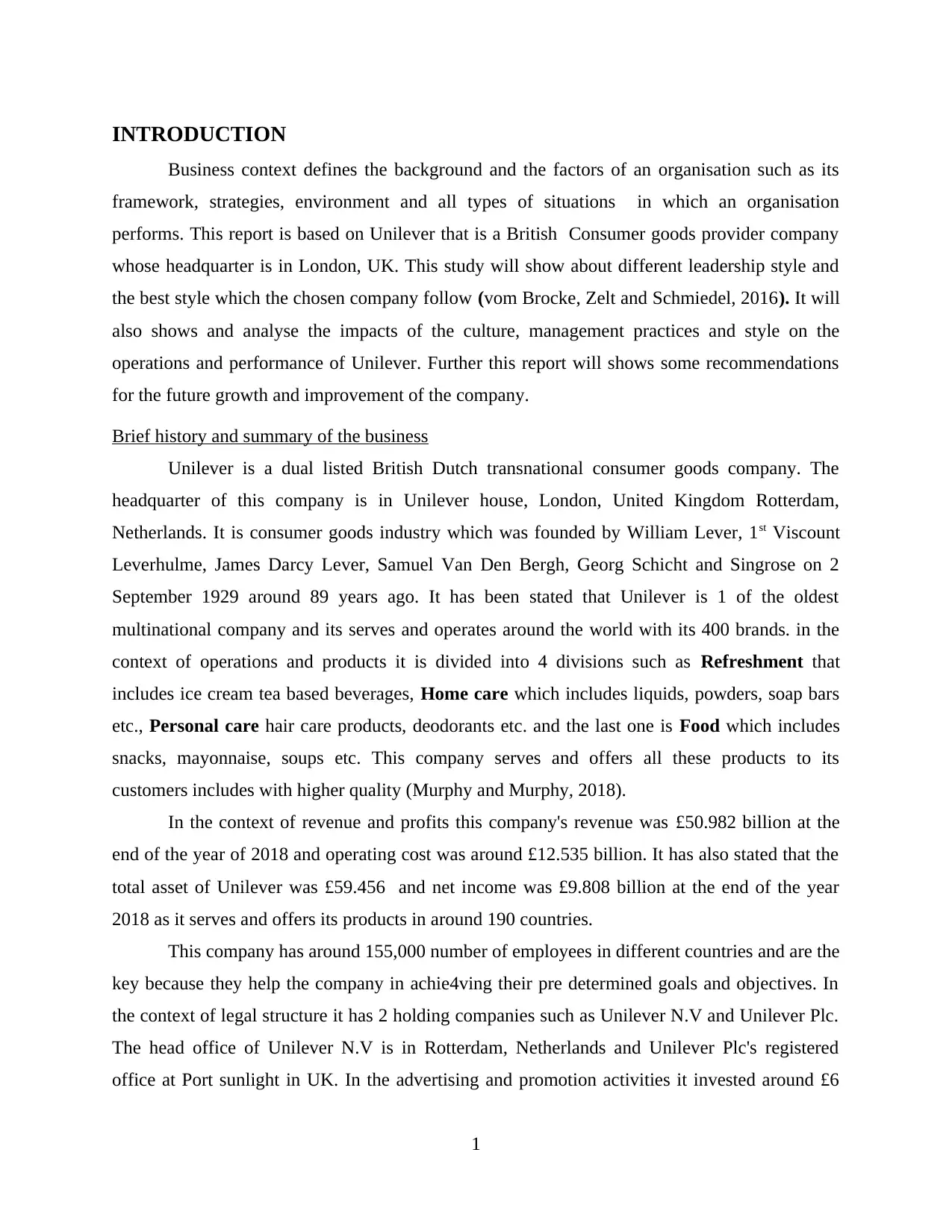
INTRODUCTION
Business context defines the background and the factors of an organisation such as its
framework, strategies, environment and all types of situations in which an organisation
performs. This report is based on Unilever that is a British Consumer goods provider company
whose headquarter is in London, UK. This study will show about different leadership style and
the best style which the chosen company follow (vom Brocke, Zelt and Schmiedel, 2016). It will
also shows and analyse the impacts of the culture, management practices and style on the
operations and performance of Unilever. Further this report will shows some recommendations
for the future growth and improvement of the company.
Brief history and summary of the business
Unilever is a dual listed British Dutch transnational consumer goods company. The
headquarter of this company is in Unilever house, London, United Kingdom Rotterdam,
Netherlands. It is consumer goods industry which was founded by William Lever, 1st Viscount
Leverhulme, James Darcy Lever, Samuel Van Den Bergh, Georg Schicht and Singrose on 2
September 1929 around 89 years ago. It has been stated that Unilever is 1 of the oldest
multinational company and its serves and operates around the world with its 400 brands. in the
context of operations and products it is divided into 4 divisions such as Refreshment that
includes ice cream tea based beverages, Home care which includes liquids, powders, soap bars
etc., Personal care hair care products, deodorants etc. and the last one is Food which includes
snacks, mayonnaise, soups etc. This company serves and offers all these products to its
customers includes with higher quality (Murphy and Murphy, 2018).
In the context of revenue and profits this company's revenue was £50.982 billion at the
end of the year of 2018 and operating cost was around £12.535 billion. It has also stated that the
total asset of Unilever was £59.456 and net income was £9.808 billion at the end of the year
2018 as it serves and offers its products in around 190 countries.
This company has around 155,000 number of employees in different countries and are the
key because they help the company in achie4ving their pre determined goals and objectives. In
the context of legal structure it has 2 holding companies such as Unilever N.V and Unilever Plc.
The head office of Unilever N.V is in Rotterdam, Netherlands and Unilever Plc's registered
office at Port sunlight in UK. In the advertising and promotion activities it invested around £6
1
Business context defines the background and the factors of an organisation such as its
framework, strategies, environment and all types of situations in which an organisation
performs. This report is based on Unilever that is a British Consumer goods provider company
whose headquarter is in London, UK. This study will show about different leadership style and
the best style which the chosen company follow (vom Brocke, Zelt and Schmiedel, 2016). It will
also shows and analyse the impacts of the culture, management practices and style on the
operations and performance of Unilever. Further this report will shows some recommendations
for the future growth and improvement of the company.
Brief history and summary of the business
Unilever is a dual listed British Dutch transnational consumer goods company. The
headquarter of this company is in Unilever house, London, United Kingdom Rotterdam,
Netherlands. It is consumer goods industry which was founded by William Lever, 1st Viscount
Leverhulme, James Darcy Lever, Samuel Van Den Bergh, Georg Schicht and Singrose on 2
September 1929 around 89 years ago. It has been stated that Unilever is 1 of the oldest
multinational company and its serves and operates around the world with its 400 brands. in the
context of operations and products it is divided into 4 divisions such as Refreshment that
includes ice cream tea based beverages, Home care which includes liquids, powders, soap bars
etc., Personal care hair care products, deodorants etc. and the last one is Food which includes
snacks, mayonnaise, soups etc. This company serves and offers all these products to its
customers includes with higher quality (Murphy and Murphy, 2018).
In the context of revenue and profits this company's revenue was £50.982 billion at the
end of the year of 2018 and operating cost was around £12.535 billion. It has also stated that the
total asset of Unilever was £59.456 and net income was £9.808 billion at the end of the year
2018 as it serves and offers its products in around 190 countries.
This company has around 155,000 number of employees in different countries and are the
key because they help the company in achie4ving their pre determined goals and objectives. In
the context of legal structure it has 2 holding companies such as Unilever N.V and Unilever Plc.
The head office of Unilever N.V is in Rotterdam, Netherlands and Unilever Plc's registered
office at Port sunlight in UK. In the advertising and promotion activities it invested around £6
1
⊘ This is a preview!⊘
Do you want full access?
Subscribe today to unlock all pages.

Trusted by 1+ million students worldwide
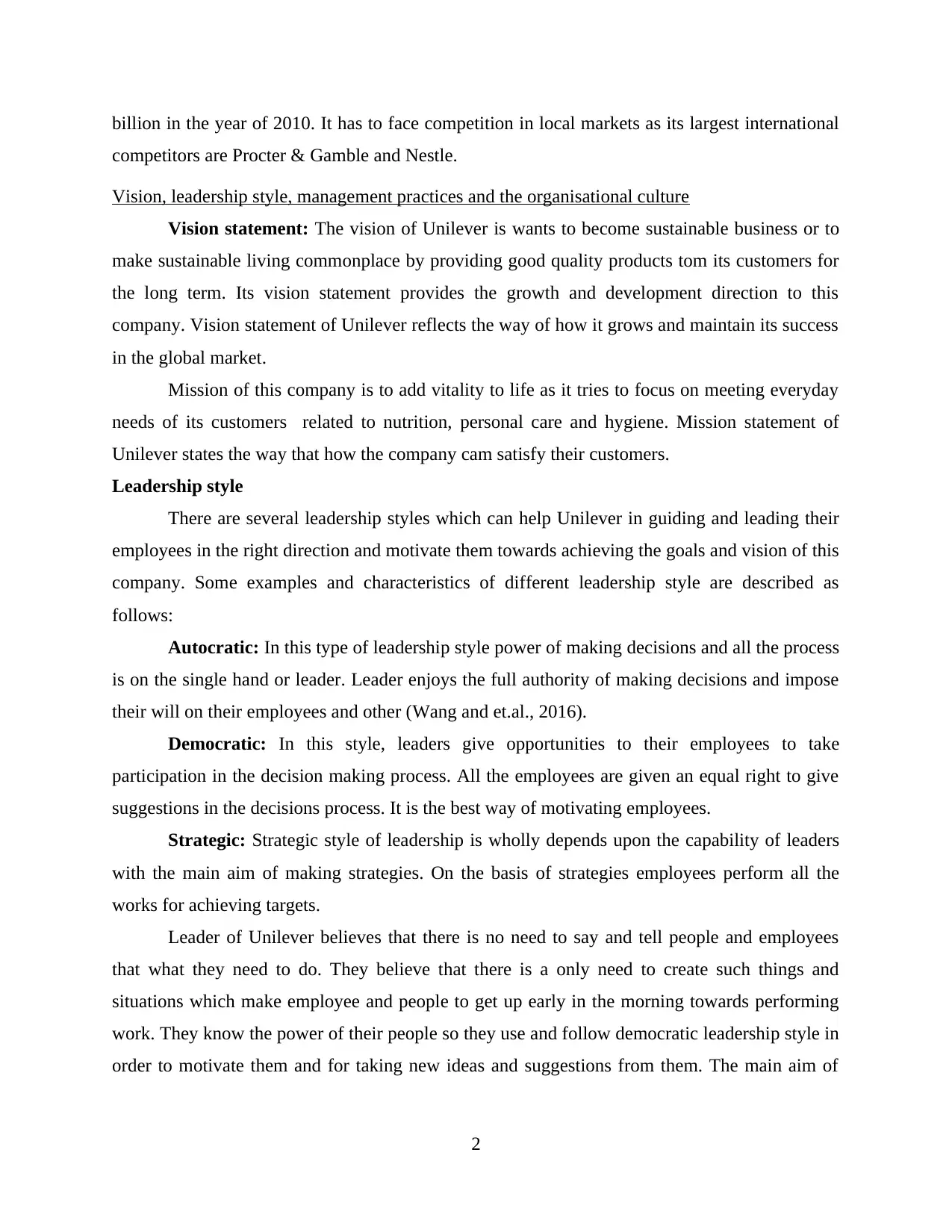
billion in the year of 2010. It has to face competition in local markets as its largest international
competitors are Procter & Gamble and Nestle.
Vision, leadership style, management practices and the organisational culture
Vision statement: The vision of Unilever is wants to become sustainable business or to
make sustainable living commonplace by providing good quality products tom its customers for
the long term. Its vision statement provides the growth and development direction to this
company. Vision statement of Unilever reflects the way of how it grows and maintain its success
in the global market.
Mission of this company is to add vitality to life as it tries to focus on meeting everyday
needs of its customers related to nutrition, personal care and hygiene. Mission statement of
Unilever states the way that how the company cam satisfy their customers.
Leadership style
There are several leadership styles which can help Unilever in guiding and leading their
employees in the right direction and motivate them towards achieving the goals and vision of this
company. Some examples and characteristics of different leadership style are described as
follows:
Autocratic: In this type of leadership style power of making decisions and all the process
is on the single hand or leader. Leader enjoys the full authority of making decisions and impose
their will on their employees and other (Wang and et.al., 2016).
Democratic: In this style, leaders give opportunities to their employees to take
participation in the decision making process. All the employees are given an equal right to give
suggestions in the decisions process. It is the best way of motivating employees.
Strategic: Strategic style of leadership is wholly depends upon the capability of leaders
with the main aim of making strategies. On the basis of strategies employees perform all the
works for achieving targets.
Leader of Unilever believes that there is no need to say and tell people and employees
that what they need to do. They believe that there is a only need to create such things and
situations which make employee and people to get up early in the morning towards performing
work. They know the power of their people so they use and follow democratic leadership style in
order to motivate them and for taking new ideas and suggestions from them. The main aim of
2
competitors are Procter & Gamble and Nestle.
Vision, leadership style, management practices and the organisational culture
Vision statement: The vision of Unilever is wants to become sustainable business or to
make sustainable living commonplace by providing good quality products tom its customers for
the long term. Its vision statement provides the growth and development direction to this
company. Vision statement of Unilever reflects the way of how it grows and maintain its success
in the global market.
Mission of this company is to add vitality to life as it tries to focus on meeting everyday
needs of its customers related to nutrition, personal care and hygiene. Mission statement of
Unilever states the way that how the company cam satisfy their customers.
Leadership style
There are several leadership styles which can help Unilever in guiding and leading their
employees in the right direction and motivate them towards achieving the goals and vision of this
company. Some examples and characteristics of different leadership style are described as
follows:
Autocratic: In this type of leadership style power of making decisions and all the process
is on the single hand or leader. Leader enjoys the full authority of making decisions and impose
their will on their employees and other (Wang and et.al., 2016).
Democratic: In this style, leaders give opportunities to their employees to take
participation in the decision making process. All the employees are given an equal right to give
suggestions in the decisions process. It is the best way of motivating employees.
Strategic: Strategic style of leadership is wholly depends upon the capability of leaders
with the main aim of making strategies. On the basis of strategies employees perform all the
works for achieving targets.
Leader of Unilever believes that there is no need to say and tell people and employees
that what they need to do. They believe that there is a only need to create such things and
situations which make employee and people to get up early in the morning towards performing
work. They know the power of their people so they use and follow democratic leadership style in
order to motivate them and for taking new ideas and suggestions from them. The main aim of
2
Paraphrase This Document
Need a fresh take? Get an instant paraphrase of this document with our AI Paraphraser
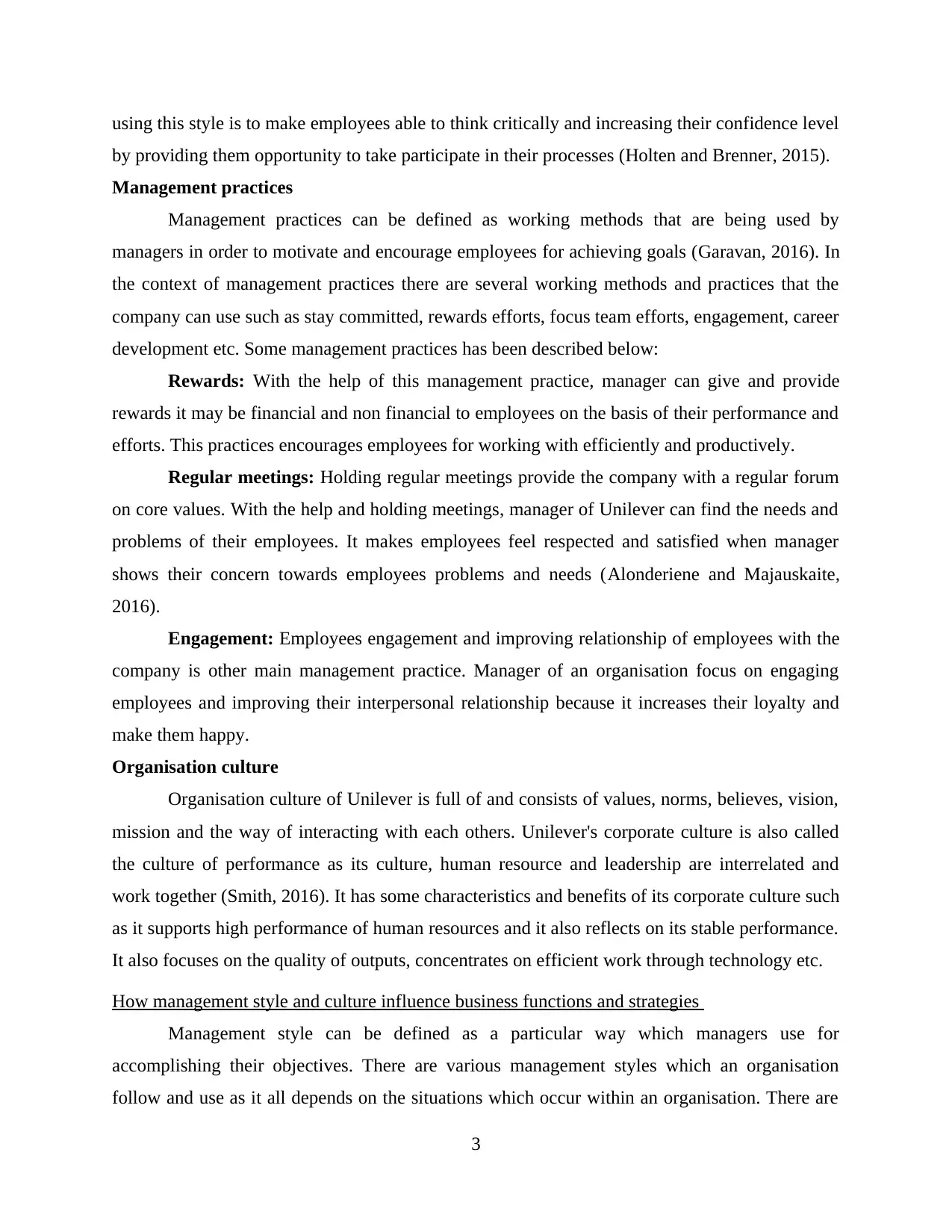
using this style is to make employees able to think critically and increasing their confidence level
by providing them opportunity to take participate in their processes (Holten and Brenner, 2015).
Management practices
Management practices can be defined as working methods that are being used by
managers in order to motivate and encourage employees for achieving goals (Garavan, 2016). In
the context of management practices there are several working methods and practices that the
company can use such as stay committed, rewards efforts, focus team efforts, engagement, career
development etc. Some management practices has been described below:
Rewards: With the help of this management practice, manager can give and provide
rewards it may be financial and non financial to employees on the basis of their performance and
efforts. This practices encourages employees for working with efficiently and productively.
Regular meetings: Holding regular meetings provide the company with a regular forum
on core values. With the help and holding meetings, manager of Unilever can find the needs and
problems of their employees. It makes employees feel respected and satisfied when manager
shows their concern towards employees problems and needs (Alonderiene and Majauskaite,
2016).
Engagement: Employees engagement and improving relationship of employees with the
company is other main management practice. Manager of an organisation focus on engaging
employees and improving their interpersonal relationship because it increases their loyalty and
make them happy.
Organisation culture
Organisation culture of Unilever is full of and consists of values, norms, believes, vision,
mission and the way of interacting with each others. Unilever's corporate culture is also called
the culture of performance as its culture, human resource and leadership are interrelated and
work together (Smith, 2016). It has some characteristics and benefits of its corporate culture such
as it supports high performance of human resources and it also reflects on its stable performance.
It also focuses on the quality of outputs, concentrates on efficient work through technology etc.
How management style and culture influence business functions and strategies
Management style can be defined as a particular way which managers use for
accomplishing their objectives. There are various management styles which an organisation
follow and use as it all depends on the situations which occur within an organisation. There are
3
by providing them opportunity to take participate in their processes (Holten and Brenner, 2015).
Management practices
Management practices can be defined as working methods that are being used by
managers in order to motivate and encourage employees for achieving goals (Garavan, 2016). In
the context of management practices there are several working methods and practices that the
company can use such as stay committed, rewards efforts, focus team efforts, engagement, career
development etc. Some management practices has been described below:
Rewards: With the help of this management practice, manager can give and provide
rewards it may be financial and non financial to employees on the basis of their performance and
efforts. This practices encourages employees for working with efficiently and productively.
Regular meetings: Holding regular meetings provide the company with a regular forum
on core values. With the help and holding meetings, manager of Unilever can find the needs and
problems of their employees. It makes employees feel respected and satisfied when manager
shows their concern towards employees problems and needs (Alonderiene and Majauskaite,
2016).
Engagement: Employees engagement and improving relationship of employees with the
company is other main management practice. Manager of an organisation focus on engaging
employees and improving their interpersonal relationship because it increases their loyalty and
make them happy.
Organisation culture
Organisation culture of Unilever is full of and consists of values, norms, believes, vision,
mission and the way of interacting with each others. Unilever's corporate culture is also called
the culture of performance as its culture, human resource and leadership are interrelated and
work together (Smith, 2016). It has some characteristics and benefits of its corporate culture such
as it supports high performance of human resources and it also reflects on its stable performance.
It also focuses on the quality of outputs, concentrates on efficient work through technology etc.
How management style and culture influence business functions and strategies
Management style can be defined as a particular way which managers use for
accomplishing their objectives. There are various management styles which an organisation
follow and use as it all depends on the situations which occur within an organisation. There are
3
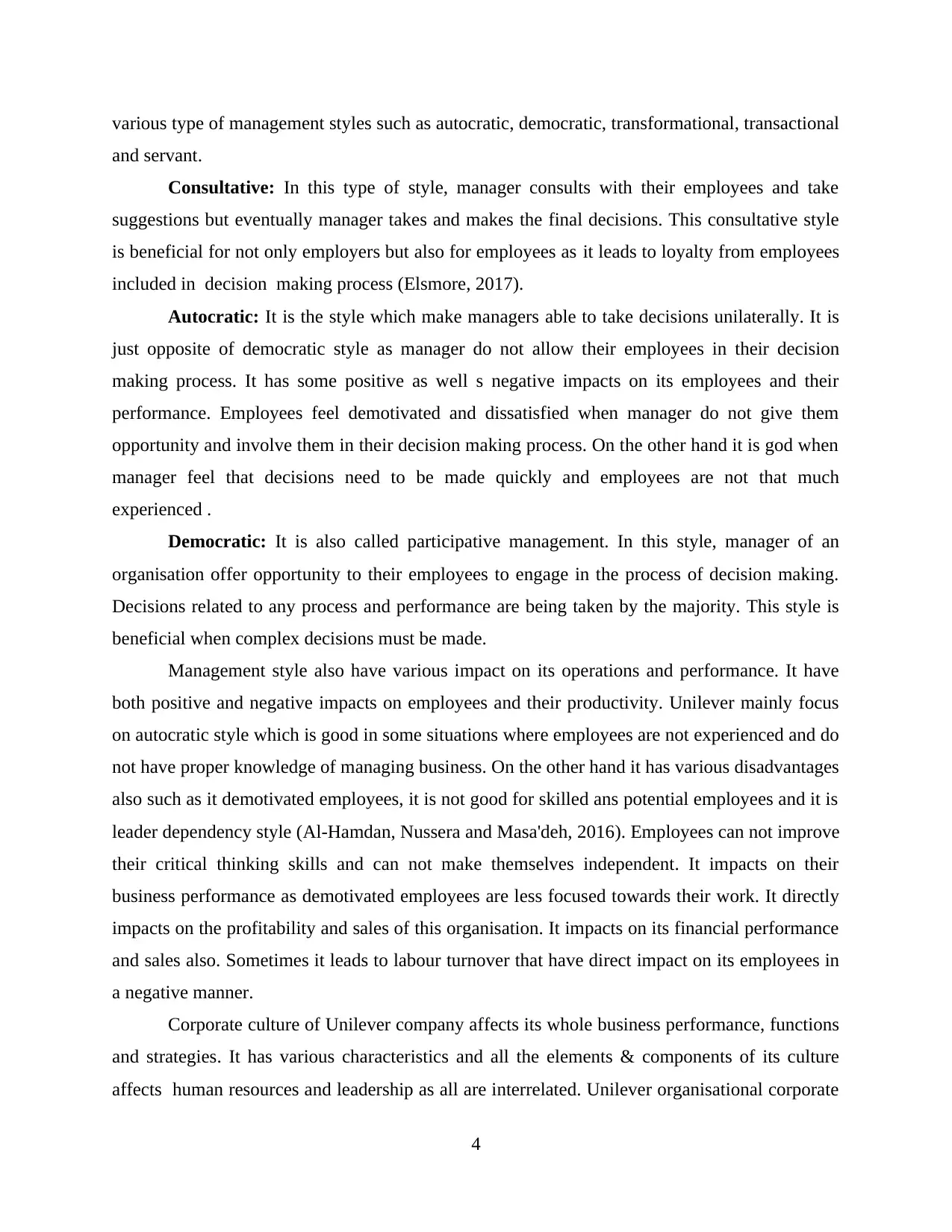
various type of management styles such as autocratic, democratic, transformational, transactional
and servant.
Consultative: In this type of style, manager consults with their employees and take
suggestions but eventually manager takes and makes the final decisions. This consultative style
is beneficial for not only employers but also for employees as it leads to loyalty from employees
included in decision making process (Elsmore, 2017).
Autocratic: It is the style which make managers able to take decisions unilaterally. It is
just opposite of democratic style as manager do not allow their employees in their decision
making process. It has some positive as well s negative impacts on its employees and their
performance. Employees feel demotivated and dissatisfied when manager do not give them
opportunity and involve them in their decision making process. On the other hand it is god when
manager feel that decisions need to be made quickly and employees are not that much
experienced .
Democratic: It is also called participative management. In this style, manager of an
organisation offer opportunity to their employees to engage in the process of decision making.
Decisions related to any process and performance are being taken by the majority. This style is
beneficial when complex decisions must be made.
Management style also have various impact on its operations and performance. It have
both positive and negative impacts on employees and their productivity. Unilever mainly focus
on autocratic style which is good in some situations where employees are not experienced and do
not have proper knowledge of managing business. On the other hand it has various disadvantages
also such as it demotivated employees, it is not good for skilled ans potential employees and it is
leader dependency style (Al‐Hamdan, Nussera and Masa'deh, 2016). Employees can not improve
their critical thinking skills and can not make themselves independent. It impacts on their
business performance as demotivated employees are less focused towards their work. It directly
impacts on the profitability and sales of this organisation. It impacts on its financial performance
and sales also. Sometimes it leads to labour turnover that have direct impact on its employees in
a negative manner.
Corporate culture of Unilever company affects its whole business performance, functions
and strategies. It has various characteristics and all the elements & components of its culture
affects human resources and leadership as all are interrelated. Unilever organisational corporate
4
and servant.
Consultative: In this type of style, manager consults with their employees and take
suggestions but eventually manager takes and makes the final decisions. This consultative style
is beneficial for not only employers but also for employees as it leads to loyalty from employees
included in decision making process (Elsmore, 2017).
Autocratic: It is the style which make managers able to take decisions unilaterally. It is
just opposite of democratic style as manager do not allow their employees in their decision
making process. It has some positive as well s negative impacts on its employees and their
performance. Employees feel demotivated and dissatisfied when manager do not give them
opportunity and involve them in their decision making process. On the other hand it is god when
manager feel that decisions need to be made quickly and employees are not that much
experienced .
Democratic: It is also called participative management. In this style, manager of an
organisation offer opportunity to their employees to engage in the process of decision making.
Decisions related to any process and performance are being taken by the majority. This style is
beneficial when complex decisions must be made.
Management style also have various impact on its operations and performance. It have
both positive and negative impacts on employees and their productivity. Unilever mainly focus
on autocratic style which is good in some situations where employees are not experienced and do
not have proper knowledge of managing business. On the other hand it has various disadvantages
also such as it demotivated employees, it is not good for skilled ans potential employees and it is
leader dependency style (Al‐Hamdan, Nussera and Masa'deh, 2016). Employees can not improve
their critical thinking skills and can not make themselves independent. It impacts on their
business performance as demotivated employees are less focused towards their work. It directly
impacts on the profitability and sales of this organisation. It impacts on its financial performance
and sales also. Sometimes it leads to labour turnover that have direct impact on its employees in
a negative manner.
Corporate culture of Unilever company affects its whole business performance, functions
and strategies. It has various characteristics and all the elements & components of its culture
affects human resources and leadership as all are interrelated. Unilever organisational corporate
4
⊘ This is a preview!⊘
Do you want full access?
Subscribe today to unlock all pages.

Trusted by 1+ million students worldwide
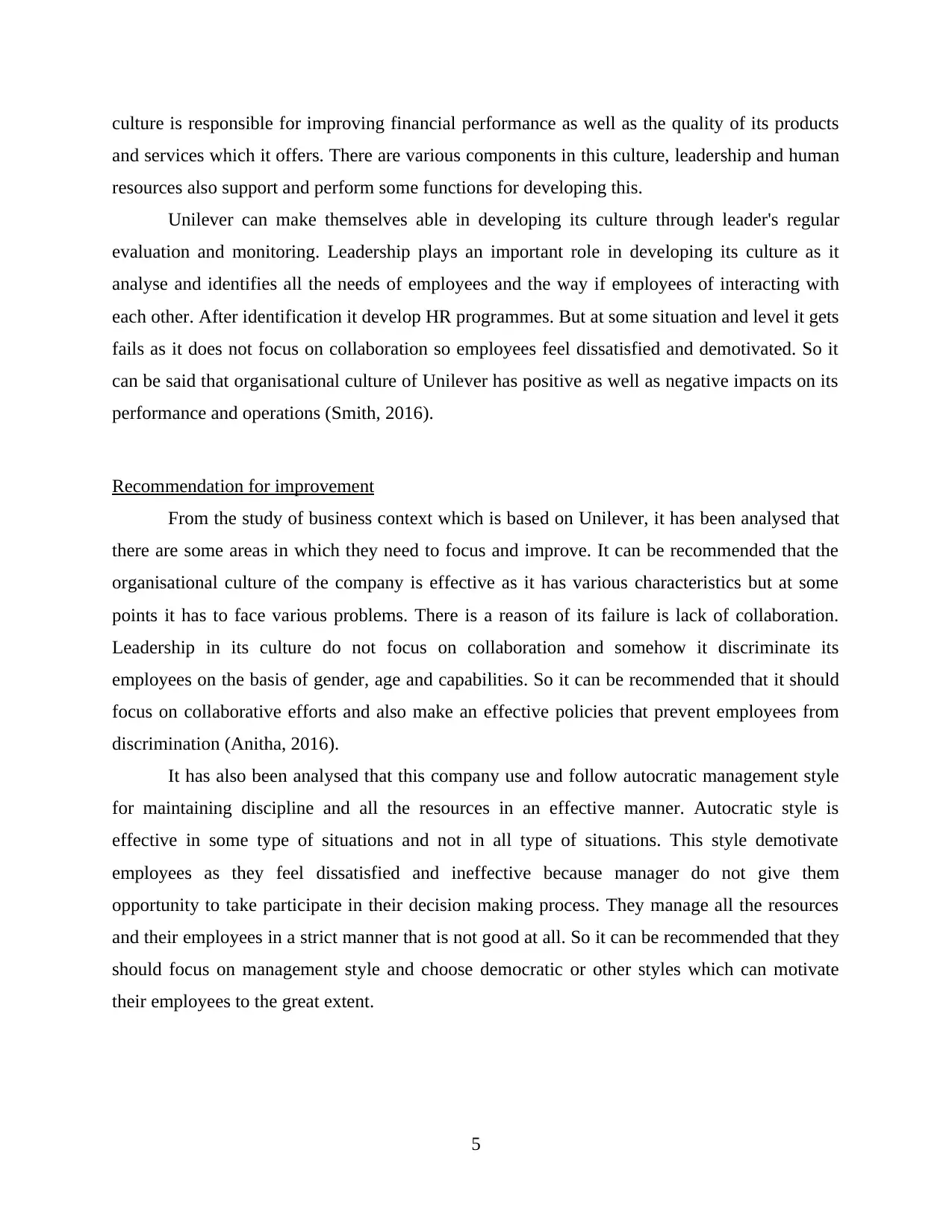
culture is responsible for improving financial performance as well as the quality of its products
and services which it offers. There are various components in this culture, leadership and human
resources also support and perform some functions for developing this.
Unilever can make themselves able in developing its culture through leader's regular
evaluation and monitoring. Leadership plays an important role in developing its culture as it
analyse and identifies all the needs of employees and the way if employees of interacting with
each other. After identification it develop HR programmes. But at some situation and level it gets
fails as it does not focus on collaboration so employees feel dissatisfied and demotivated. So it
can be said that organisational culture of Unilever has positive as well as negative impacts on its
performance and operations (Smith, 2016).
Recommendation for improvement
From the study of business context which is based on Unilever, it has been analysed that
there are some areas in which they need to focus and improve. It can be recommended that the
organisational culture of the company is effective as it has various characteristics but at some
points it has to face various problems. There is a reason of its failure is lack of collaboration.
Leadership in its culture do not focus on collaboration and somehow it discriminate its
employees on the basis of gender, age and capabilities. So it can be recommended that it should
focus on collaborative efforts and also make an effective policies that prevent employees from
discrimination (Anitha, 2016).
It has also been analysed that this company use and follow autocratic management style
for maintaining discipline and all the resources in an effective manner. Autocratic style is
effective in some type of situations and not in all type of situations. This style demotivate
employees as they feel dissatisfied and ineffective because manager do not give them
opportunity to take participate in their decision making process. They manage all the resources
and their employees in a strict manner that is not good at all. So it can be recommended that they
should focus on management style and choose democratic or other styles which can motivate
their employees to the great extent.
5
and services which it offers. There are various components in this culture, leadership and human
resources also support and perform some functions for developing this.
Unilever can make themselves able in developing its culture through leader's regular
evaluation and monitoring. Leadership plays an important role in developing its culture as it
analyse and identifies all the needs of employees and the way if employees of interacting with
each other. After identification it develop HR programmes. But at some situation and level it gets
fails as it does not focus on collaboration so employees feel dissatisfied and demotivated. So it
can be said that organisational culture of Unilever has positive as well as negative impacts on its
performance and operations (Smith, 2016).
Recommendation for improvement
From the study of business context which is based on Unilever, it has been analysed that
there are some areas in which they need to focus and improve. It can be recommended that the
organisational culture of the company is effective as it has various characteristics but at some
points it has to face various problems. There is a reason of its failure is lack of collaboration.
Leadership in its culture do not focus on collaboration and somehow it discriminate its
employees on the basis of gender, age and capabilities. So it can be recommended that it should
focus on collaborative efforts and also make an effective policies that prevent employees from
discrimination (Anitha, 2016).
It has also been analysed that this company use and follow autocratic management style
for maintaining discipline and all the resources in an effective manner. Autocratic style is
effective in some type of situations and not in all type of situations. This style demotivate
employees as they feel dissatisfied and ineffective because manager do not give them
opportunity to take participate in their decision making process. They manage all the resources
and their employees in a strict manner that is not good at all. So it can be recommended that they
should focus on management style and choose democratic or other styles which can motivate
their employees to the great extent.
5
Paraphrase This Document
Need a fresh take? Get an instant paraphrase of this document with our AI Paraphraser
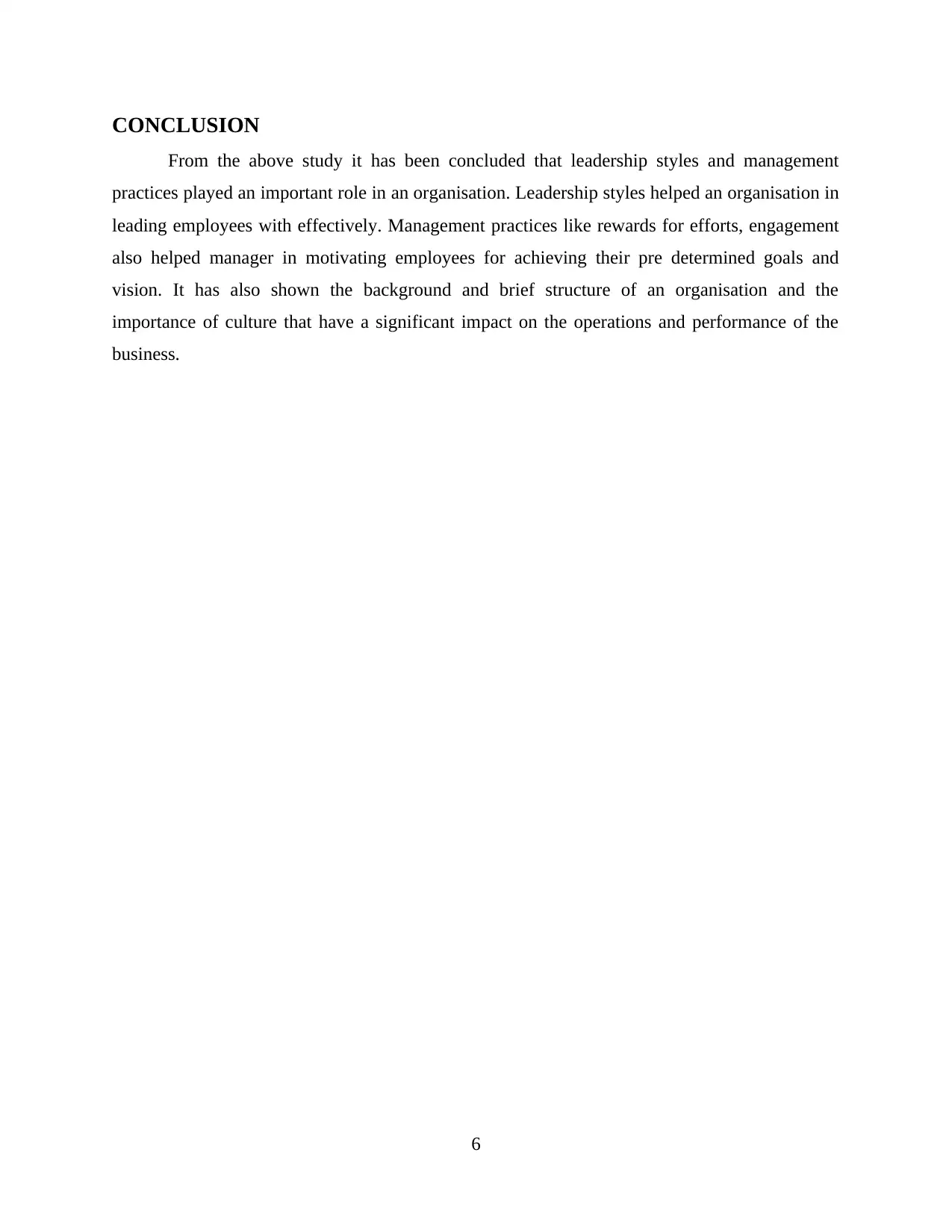
CONCLUSION
From the above study it has been concluded that leadership styles and management
practices played an important role in an organisation. Leadership styles helped an organisation in
leading employees with effectively. Management practices like rewards for efforts, engagement
also helped manager in motivating employees for achieving their pre determined goals and
vision. It has also shown the background and brief structure of an organisation and the
importance of culture that have a significant impact on the operations and performance of the
business.
6
From the above study it has been concluded that leadership styles and management
practices played an important role in an organisation. Leadership styles helped an organisation in
leading employees with effectively. Management practices like rewards for efforts, engagement
also helped manager in motivating employees for achieving their pre determined goals and
vision. It has also shown the background and brief structure of an organisation and the
importance of culture that have a significant impact on the operations and performance of the
business.
6
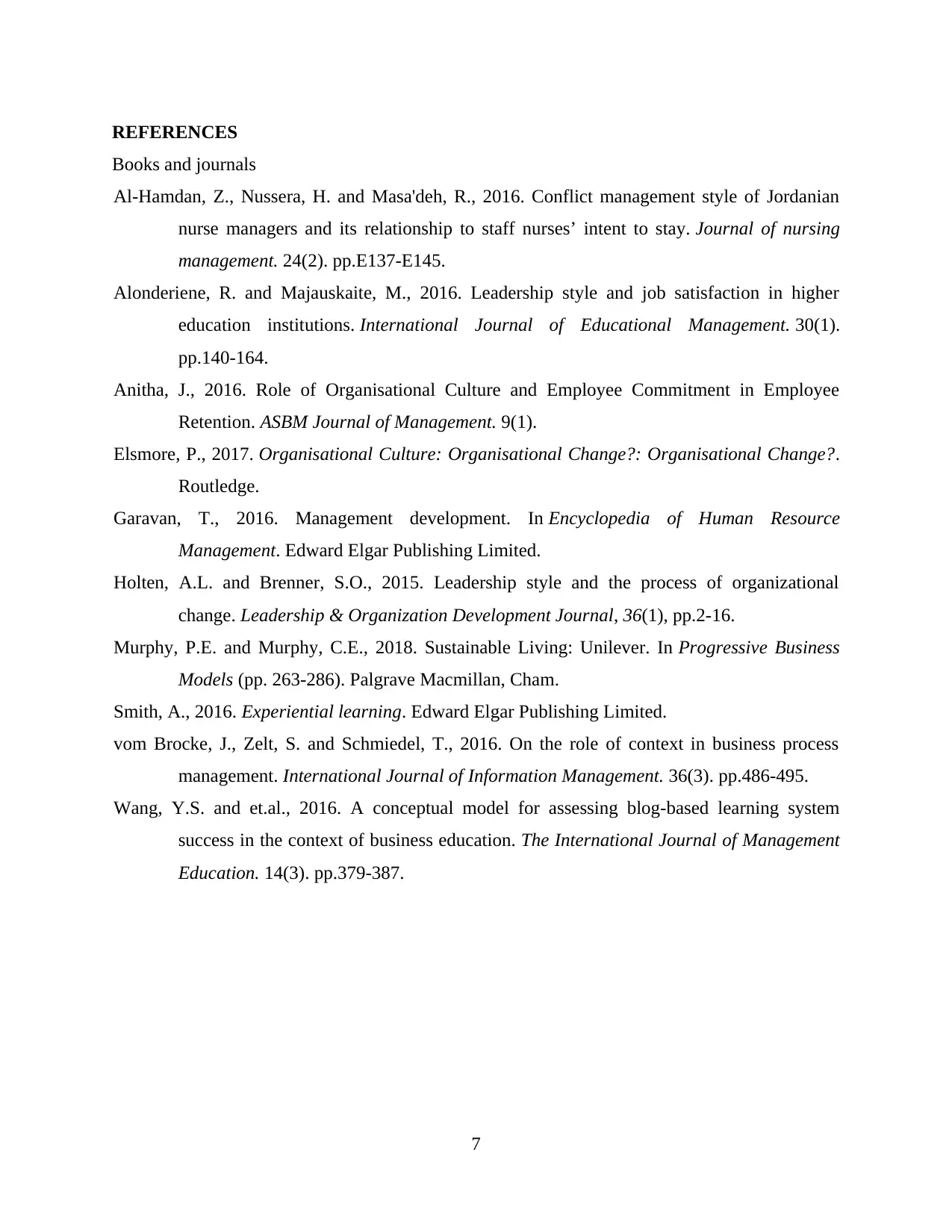
REFERENCES
Books and journals
Al‐Hamdan, Z., Nussera, H. and Masa'deh, R., 2016. Conflict management style of Jordanian
nurse managers and its relationship to staff nurses’ intent to stay. Journal of nursing
management. 24(2). pp.E137-E145.
Alonderiene, R. and Majauskaite, M., 2016. Leadership style and job satisfaction in higher
education institutions. International Journal of Educational Management. 30(1).
pp.140-164.
Anitha, J., 2016. Role of Organisational Culture and Employee Commitment in Employee
Retention. ASBM Journal of Management. 9(1).
Elsmore, P., 2017. Organisational Culture: Organisational Change?: Organisational Change?.
Routledge.
Garavan, T., 2016. Management development. In Encyclopedia of Human Resource
Management. Edward Elgar Publishing Limited.
Holten, A.L. and Brenner, S.O., 2015. Leadership style and the process of organizational
change. Leadership & Organization Development Journal, 36(1), pp.2-16.
Murphy, P.E. and Murphy, C.E., 2018. Sustainable Living: Unilever. In Progressive Business
Models (pp. 263-286). Palgrave Macmillan, Cham.
Smith, A., 2016. Experiential learning. Edward Elgar Publishing Limited.
vom Brocke, J., Zelt, S. and Schmiedel, T., 2016. On the role of context in business process
management. International Journal of Information Management. 36(3). pp.486-495.
Wang, Y.S. and et.al., 2016. A conceptual model for assessing blog-based learning system
success in the context of business education. The International Journal of Management
Education. 14(3). pp.379-387.
7
Books and journals
Al‐Hamdan, Z., Nussera, H. and Masa'deh, R., 2016. Conflict management style of Jordanian
nurse managers and its relationship to staff nurses’ intent to stay. Journal of nursing
management. 24(2). pp.E137-E145.
Alonderiene, R. and Majauskaite, M., 2016. Leadership style and job satisfaction in higher
education institutions. International Journal of Educational Management. 30(1).
pp.140-164.
Anitha, J., 2016. Role of Organisational Culture and Employee Commitment in Employee
Retention. ASBM Journal of Management. 9(1).
Elsmore, P., 2017. Organisational Culture: Organisational Change?: Organisational Change?.
Routledge.
Garavan, T., 2016. Management development. In Encyclopedia of Human Resource
Management. Edward Elgar Publishing Limited.
Holten, A.L. and Brenner, S.O., 2015. Leadership style and the process of organizational
change. Leadership & Organization Development Journal, 36(1), pp.2-16.
Murphy, P.E. and Murphy, C.E., 2018. Sustainable Living: Unilever. In Progressive Business
Models (pp. 263-286). Palgrave Macmillan, Cham.
Smith, A., 2016. Experiential learning. Edward Elgar Publishing Limited.
vom Brocke, J., Zelt, S. and Schmiedel, T., 2016. On the role of context in business process
management. International Journal of Information Management. 36(3). pp.486-495.
Wang, Y.S. and et.al., 2016. A conceptual model for assessing blog-based learning system
success in the context of business education. The International Journal of Management
Education. 14(3). pp.379-387.
7
⊘ This is a preview!⊘
Do you want full access?
Subscribe today to unlock all pages.

Trusted by 1+ million students worldwide
1 out of 9
Related Documents
Your All-in-One AI-Powered Toolkit for Academic Success.
+13062052269
info@desklib.com
Available 24*7 on WhatsApp / Email
![[object Object]](/_next/static/media/star-bottom.7253800d.svg)
Unlock your academic potential
Copyright © 2020–2026 A2Z Services. All Rights Reserved. Developed and managed by ZUCOL.





